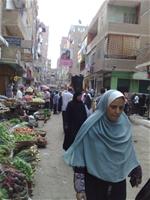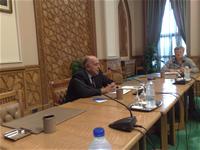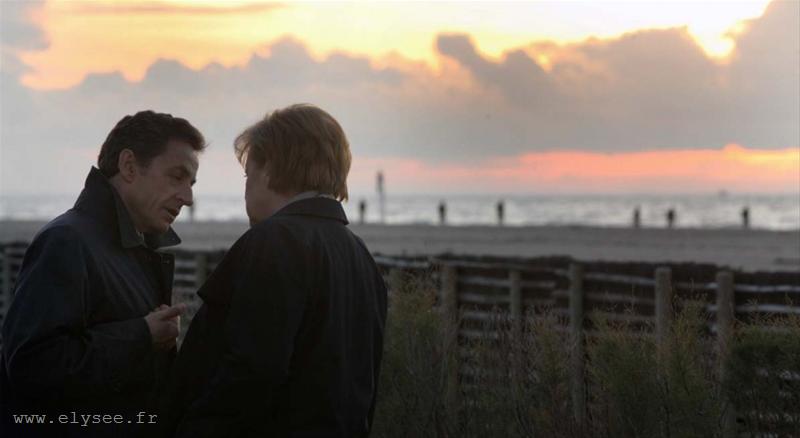The EU and its neighbours or how to protect your home
Adelina Marini, March 17, 2010
 In spite of all criticism there is one positive thing which we have to admit about the new EU High Representative for Foreign Affairs baroness Catherine Ashton - the way she arranged her programme of visits immediately after assuming her duties. She visited the Western Balkans at first, which was a clear signal that this no longer is just a zone of problems for Europe, but a region - part of Europe, about which the EU realised that it wanted and should deal with.
In spite of all criticism there is one positive thing which we have to admit about the new EU High Representative for Foreign Affairs baroness Catherine Ashton - the way she arranged her programme of visits immediately after assuming her duties. She visited the Western Balkans at first, which was a clear signal that this no longer is just a zone of problems for Europe, but a region - part of Europe, about which the EU realised that it wanted and should deal with.
The second strong message which baroness Ashton has sent is her tour of the Middle East, which started on March 14th - so far entirely a priority area for the US. Maybe, the powers of the High Representative are not enough so as to help her stand side by side with Hillary Clinton and state the European interests firmly and aloud, but the fact that she chose "now" for her tour of the Middle East, which is a direct neighbour of the EU, is more than indicating.
In fact, this attention is just a natural evolution of the recent actions of the Union, which remained quite aside from the attention of the media and the analysts. An evolution of the European Neighbourhood Policy (ENP), as it is known as.
This policy has been developed by the EU in 2004 with the main aim to avoid the appearance of new division lines between an enlarging EU and its closest neighbours. What is behind this aim is member states' desire to help their neighbours develop in such a way that it won't be necessary for the EU to constantly stand by, anticipating conflicts spill over the borders, as well as to diminish significantly the illegal immigrants' flow.
Who are EU's neighbours?
The full list of various countries around the EU is as follows: Algiers, Armenia, Azerbaijan, Belarus, Egypt, Georgia, Israel, Jordan, Lebanon, Libya, Moldova, Morocco, the Palestinian Territories, Syria, Tunisia and Ukraine.
As it can clearly be seen from this list, especially if looked upon over the map, the approach towards these countries cannot be a single one. This is why the EU divided its neighbours in 2008 during the French Presidency of the EU. The ENP was divided and as a sub-group the Union of the Mediterranean appeared - combining all countries in the Southern Mediterranean - a natural but easily overcome by immigrants border.
In 2009 the Union made another step forward in better dividing its neighbours, according to their problems, by presenting the Eastern Partnership initiative, directed towards the former Soviet Union countries.
For the 2007-2013 financial period, the EU has planned to spend 12 bn euro. Although the sum might not seem large, distributed among 16 countries it is no longer that impressive.
What is the money for?
To answer this question we will have a closer look at Egypt - not only because this is the first leg of Catherine Ashton's Middle East tour, but also because this is a very special case for the EU, mainly for political reasons. With all criticism for human rights abuses taken into account, as well as the level of democratisation and other requirements of the developed Western world, Egypt is the country which for several decades now is succeeding in protecting itself against internal Islamist conflicts. The firm hand of president Hosni Mubarak, the strong presence of the security forces in the streets, even the passing through a scanner in shops and hotels, speaks clearly of the fact that Egypt is reliable in a very tense region - a territory of conflicts for more than 60 years now.
In the same time Egypt is a country with large population, extreme poverty and not much of resources to help feed its population. The fight with the desert, the conflicts in neighbouring countries which prevent normal trade and development, the large share of illiterate people - 65%, according to the official data, are all factors which speak unequivocally of a fragile stability. Unemployment is 35 per cent and half of the population is living with $2 a day. The nation has also enormous demographic growth of 7.2% which, for religious reasons, is growing faster and faster.
And let us again say that these are the official data. This is important to emphasize because, unlike the problems many of EU's member states are facing with the European funds' absorption, the criticism and constant control of the European institutions, this fastidiousness and reportability is lacking in EU's approach towards Egypt.
A very eloquent example for this are the micro credit projects, managed directly  by theDelegation of the European Commission in Cairo. The money goes to places like El souk street in the Egyptian capital - a market in a very poor quarter of the city. Most of the traders there are not even registered as a firm or any other documentary existence. Nevertheless, the local office for micro credits selects those of them who are willing to develop their business. They get money for free, without reporting, based simply on trust, hoping that the money could pull these people out of their extreme poverty which you could see on the photos, euinside took in October 2009.
by theDelegation of the European Commission in Cairo. The money goes to places like El souk street in the Egyptian capital - a market in a very poor quarter of the city. Most of the traders there are not even registered as a firm or any other documentary existence. Nevertheless, the local office for micro credits selects those of them who are willing to develop their business. They get money for free, without reporting, based simply on trust, hoping that the money could pull these people out of their extreme poverty which you could see on the photos, euinside took in October 2009.
 Another project the EU is financing in Egypt is to reform the System for Technical and Vocational Training (TVET). This project is co-financed 50-50 by the EU and the Egyptian government. According to official data out of 72.6 million people population of Egypt, 24 mn are fit to work. One of the good examples for well spent money is the tailor factory in Giza. Special attention in vocational training and the selection of workers is being paid to women because women's presence at the labour market in Egypt is the lowest in the world.
Another project the EU is financing in Egypt is to reform the System for Technical and Vocational Training (TVET). This project is co-financed 50-50 by the EU and the Egyptian government. According to official data out of 72.6 million people population of Egypt, 24 mn are fit to work. One of the good examples for well spent money is the tailor factory in Giza. Special attention in vocational training and the selection of workers is being paid to women because women's presence at the labour market in Egypt is the lowest in the world.
The EU's biggest problem though, as well as for the Egyptian government is the education system reform. If you ask an ordinary Egyptian, representing the middle class of the country, he or she will tell you that he would never let his child into a public school. First of all, the material base is poor. Second, the teachers are selected literally from nowhere, they have poor education themselves and are very low paid. It is not an accident that private schools have more and more supporters. However, the education in many of these schools is with religious grounds. The lack of satisfactory social services, provided by the government, is the reason for the discontent and the success of many radical Islamic groups, the most popular of which is the Muslim Brotherhood.
It is hard to describe such a neighbour of the EU, as Egypt, in just one article. However, all looks, both of the government and the population, are cast towards Europe. Not only because it is close, not only because it is a natural geographic partner and a market, but because it is an alternative to the US, which for the 8 years of president Bush and the not very decisive actions of president Barack Obama, have created very strong negative moods in the Middle East. Furthermore, the aid the US is sending in Egypt is a little less than 1% of the Gross National Income of nation and is directed mainly to the defense. Unlike the EU, whose aid is also not very big, but is directed to work from the bottom-up and, practically, is helping the authorities.
The needs of Egypt are best described by the Egyptian minister of International Cooperation. She is a woman, educated abroad, who also worked as a representative of Egypt in various international organisations abroad - Fayza Abul Naga. You can see on the video below the discussion a group of European journalists, including euinside, held with her in October last year.
In the meantime, if the EU misses the momentum with Egypt's interest towards the aid and cooperation, it is very possible for the EU to create a larger problem in its Middle East Neighbourhood. A visit in the Al Azar university in Cairo clearly shows this. 130,00 students study there theology, philology, medicine, secular studies, literature, Islamic studies. There is a separate faculty on Sharia. On the video below you can see the extreme ardour of the dean of the faculty, when responding to questions about Egypt's relations with Israel, about the Palestinian refugees, about the tunnels between Egypt and the Gaza Strip. His enthusiasm, which is in Arabic language as he did not give the interpretor time to translate, shows clearly what the moods are in an influential institution like the Al Azar university with more than 1,000 years of history.
And as we started this article from the visit of EU's High representative for Foreign Affairs, this is an area where it is important that we hear the Egyptian opinion before and after the Lisbon Treaty. Before the Lisbon Treaty Egypt held talks on foreign affairs issues with the previous High Representative for Foreign Policy and Security Javier Solana, with the Commissioner on External Relations and, very important - bilaterally with member states.
Egypt has traditional relations with some countries, as ambassador Nehad Abdel- Latif explains from the Egyptian Foreign Ministry. He underlined though, that although this might seem as a paradox, this is not about "the one versus the other thing". Later in our conversation he becomes more forthcoming: "It is difficult with the EU because in the other cases we have 1 state and, of course, 1 foreign policy. The EU has 27 member states. Maybe with the Lisbon Treaty there will be more leverage. When the EU has a single position, then it can help a lot", Nehad Abdel-Latif further explains, adding that Egypt wants to work with "young" Europe, the new member states so as to develop trade and investments.
Latif explains from the Egyptian Foreign Ministry. He underlined though, that although this might seem as a paradox, this is not about "the one versus the other thing". Later in our conversation he becomes more forthcoming: "It is difficult with the EU because in the other cases we have 1 state and, of course, 1 foreign policy. The EU has 27 member states. Maybe with the Lisbon Treaty there will be more leverage. When the EU has a single position, then it can help a lot", Nehad Abdel-Latif further explains, adding that Egypt wants to work with "young" Europe, the new member states so as to develop trade and investments.
He also outlined another problem, which the EU started considering recently: the visa regime. This is a serious hurdle for Union's capability to influence the education of the people who might in the future govern Egypt. An Egyptian can easily go to study in the US and then, most of them return to their homeland. Because of the tough visa restriction, this is almost impossible with the EU, mostly because of the Southern countries' fears of an increase of the immigrants flow.
The truth is, however, that if an Egyptian can afford going to study in Europe, he doesn't need to stay there. Every well educated Egyptian is welcome in the enormous state apparatus of the country. Besides, Europe would also benefit more from better educated (in Europe) immigrants, than the illiterate labourers. This is why the US is a winner - they offer many and flexible student programmes, scholarships, opportunities.
Ruling elites, analysts, teachers in Egypt are unanimous - the EU has an advantage, compared to the US, but the Union is lacking the vision it had for Eastern Europe. The European Neighbourhood Policy is a step in the right direction, but it is a small and a faltering one, they say. Now, with the choice of baroness Ashton her first visit of her Middle East tour to be in Egypt, as well as with the decision of the European Commission's president Jose Manuel Barroso to make the Neighbourhood policy a separate portfolio, together with enlargement, there is an opportunity for a new beginning. Because, as the saying goes - good neighbours, quiet home.
 | © euinside
| © euinside | © The Council of the European Union
| © The Council of the European Union | © www.elysee.fr
| © www.elysee.fr